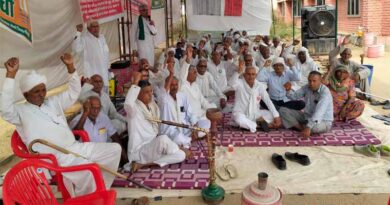
Why Are Farmers Furious Over the New Labour Codes?
By Jag Mohan Thaken
27 November 2025, New Delhi: To oppose the implementation of the new Labour Codes, which came into effect on 21 November, a nationwide massive protest was jointly organised on 26 November 2026 by Trade Unions and the Samyukta Kisan Morcha (SKM), a major farmers’ union. According to the trade unions, demonstrations were held in more than 500 districts. Highlighting the ill effects of these new codes, protesters expressed concern over rising inequality amid unprecedented price hikes in essential commodities, growing unemployment and underemployment, increasing desperation, and the continued rise in suicides among casual labourers and unemployed youth.
At first glance, the new labour codes appear to primarily affect the labour class. So why are farmers’ unions protesting against them? Why are farmers taking to the streets? How do these codes clash with the interests of the farming community?
Speaking to this author, Dr Inderjeet Singh, National Vice-President of the All India Kisan Sabha (AIKS), explains, “Farmers and the working class should not be mechanically segregated when assessing the impact of the Labour Codes. The imposition of regressive codes in place of earlier labour laws is an attempt to curb even the limited rights workers had, giving unbridled liberties to corporate companies and leaving workers at their mercy for super profits. In reality, these very corporates are also attempting to gain full control over the agricultural sector. The huge gap between raw materials and finished products defines the equation between the peasantry and corporates.”
Dr Singh further adds, “The blind pursuit of neo-liberal economic policies, especially during the last 11 years of the Modi regime, has led to vulgar levels of disparity, widening with each passing day. As part of a dual corporate strategy, the codes will deprive workers of statutory protection of their fundamental rights, while farmers will face ruthless exploitation. Corporates are the common exploiters of both productive classes—farmers and workers across organised and unorganised sectors. Their long-term interests lie in reversing neo-liberal policies and adopting measures that reduce the misery of common people, which necessarily includes reducing monopoly corporate profits. This is essential to address the perpetual economic crisis, unprecedented joblessness, and rising indebtedness among farmers and workers, all of which have reduced their purchasing power and caused a ‘lack of demand’ in economic terms.”
Dr Singh concludes, “This scenario forms the strategic link for a class alliance between farmers, workers, and all other rural–urban poor against the ruling pro-corporate and communal nexus.”
In a memorandum submitted to the President of India through district collectors on 26 November, the Rajasthan Samyukta Kisan Morcha stated, “For the past five years, India’s farmers have patiently awaited the fulfilment of assurances by the Government of India. Instead, the government has taken steps that have further eroded farmers’ economic stability, weakened agricultural self-reliance, and endangered the country’s food security.
“In the past eleven years, suicides by farmers, agricultural labourers, daily wage workers, and unemployed youth have exceeded 500,000. The Prime Minister’s 2017 promise to double farmers’ incomes by 2022 has proven false. Instead, production costs have doubled, and the cost of living has tripled. The agrarian crisis has deepened, resulting in poverty, displacement, and forced migration from rural to urban areas.”
The memorandum further noted, “The government has launched a barrage of attacks on workers, including the National Policy Framework for Agricultural Marketing, the National Cooperative Policy, the Electricity Bill 2025, the Seeds Bill 2025, and the abolition of the 11% import duty on cotton. The latest in this series is the notification of four labour codes, which dismantle fixed-term employment, introduce a 12-hour workday, and undermine the right to unionise and strike.”
Appealing for the President’s intervention, the SKM said, “In this context, we present concrete demands and request you to direct the government to immediately initiate talks and take action. If the government continues to ignore these burning demands, farmers, labourers, and the masses will have no choice but to launch a long-term, peaceful, and effective struggle. We once again urge you not to allow further denial of minimum support prices for farmers, minimum wages for workers, and employment for the unemployed youth.”
Observers closely following farmers’ issues argue that shrinking landholdings, government policies prioritising urbanisation and industrialisation, and large-scale acquisition of agricultural land for government institutions and other purposes are pushing farmers into landlessness. With limited government job opportunities, many are compelled to work in factories. In India, about 69% of the population lives in villages, with most engaged in agriculture and allied activities. Yet, as governments acquire agricultural land in the name of development, rural families are left landless, unsettled, and unemployed.
A recent example is the land pooling policy introduced by the Punjab government, which had to be repealed under political and farmer pressure. The Punjab cabinet approved the policy on 2 June 2025, launching it initially in 27 cities and towns. In response, the Shiromani Akali Dal claimed that 40,000 acres across 158 villages were being acquired under this scheme.
Punjab farmers expressed deep anxiety about their future—how would they support their families once their agricultural land was taken?
Much of the land identified for acquisition is fertile and yields three crops a year. Land is a fixed resource; its supply cannot be increased. With land being diverted to urbanisation and development projects, the area available for agriculture shrinks daily. According to farmers’ unions, more than 22,000 acres of fertile land in Punjab have already been consumed by the Bharatmala project, which they argue is unnecessary for the state and will only facilitate corporate capture. Numerous plots, colonies, and residential flats already lie vacant in cities, far exceeding current demand. They allege that the policy aims not to meet residential or industrial needs but to create a land bank for corporates and land mafias.
The major concern is the displacement of settled communities. Farmers’ unions fear that indiscriminate implementation of the scheme would have serious consequences for various social groups. Villages could be depopulated, their culture erased, and the agricultural profession wiped out. Allied activities like animal husbandry, dairying, and horticulture could collapse. Public welfare schemes such as MNREGA may disappear. Rural artisans—tailors, barbers, mechanics, small shopkeepers, cobblers, confectioners—would be displaced. Such unnecessary urbanisation, they argue, would swallow villages and uproot entire communities.
Observers believe that villagers forced out of agriculture will end up as labourers in urban industries, where the newly implemented labour codes will expose them to exploitative corporate practices. This, they argue, is why farmers and their next generation fear bearing the brunt of these labour codes.
Also Read: CNH Industrial Finance Europe S.A. 1.875% Notes Due 2026 Notice Of Redemption
📢 If You’re in Agriculture, Make Sure the Right People Hear Your Story.
From product launches to strategic announcements, Global Agriculture offers unmatched visibility across international agri-business markets. Connect with us at pr@global-agriculture.com to explore editorial and advertising opportunities that reach the right audience, worldwide.






